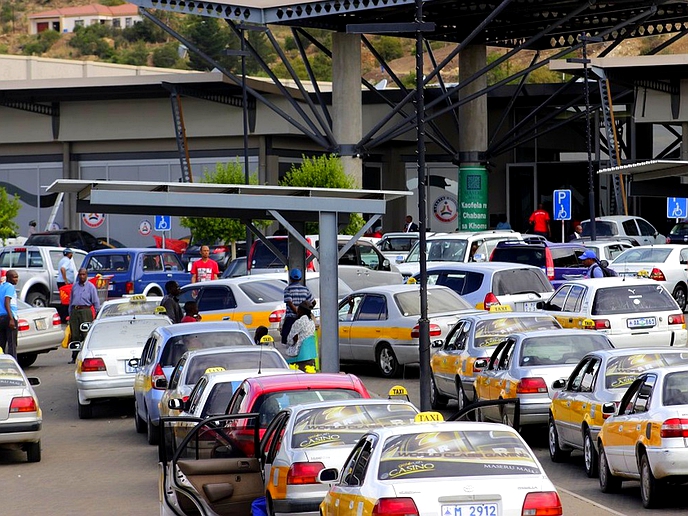INFORMAL cross border trade and commerce between Lesotho and South Africa have been severely reduced due to the restrictions on movement and other regulations introduced to curb the COVID-19 transmission.
business
March 12, 2021
NEO SENOKO
4 min read
Informal cross border trade severely injured

CBL Governor Dr Retšelisitsoe Matlanyane
This is despite the fact that essential goods and services continued to be brought into the country during the border closure periods.
Most affected have been women cross border traders, who make up the bulk of the informal cross border traders (ICBT) in the southern African region and were already disproportionally negatively impacted by gender related obstacles to trade.
This has been revealed in a new United Nations Development Programme (UNDP) study titled - The rapid assessment of informal cross border trade sector in Lesotho.
The study was conducted in partnership with the International Organisation for Migration (IOM) to understand the impact of COVID-19 on informal cross border trade including gender related analysis targeting the most economically affluent borders between Lesotho and South Africa and those where it is known that there are higher levels of cross border trade.
Informal cross border trade makes up a significant part of trade in the region, estimated at 30 to 40 percent of total trade according to the Southern African Development Community (SADC).
Lesotho, which is surrounded by South Africa, depends on its richer neighbour for over 90 percent of its consumer goods and services.
“For informal cross border traders, who rely on South Africa and cross border movement for their daily income and livelihoods, each border closure has meant that they could not cross at all to procure or sell goods and thus they have been heavily affected by these measures,” the UNDP study has shown.
As a result, some informal traders were forced out of business while smuggling of goods and services also increased along the use of irregular border crossings.
Another challenge for informal cross border traders was the fact that even during the periods when the borders were open, regular cross border traders were required to produce a valid COVID-19 certificate every time they crossed the border.
The cost of testing varied between M850 and M1 250, all of which was expensive for informal cross border traders. The certificates allowed traders to make multiple trips for 14 days, without having to take another test, but holders could still be stopped for random tests if they looked like they had symptoms and required to take another test at their expense.
“Preliminary findings on the impact of COVID-19 on different populations and economic activities in Lesotho have confirmed that informal traders and vendors along with formal micro small and medium sized enterprises have been severely impacted by effects of the measures undertaken to combat the pandemic, with significant reductions in their commercial activity, and among the more formal business actors, some of them being unable reopen their ventures due to their lack of safety nets,” the study has said.
Given Lesotho’s proximity to South Africa, traders of all sizes in the country have been highly affected by the disruptions of supply chains and the closure of borders.
Lesotho’s overall economic performance has been negatively affected by the slowed global economy over the past year. As South Africa is Lesotho’s principal trade and investment partner, the country has also been impacted by the economic doldrums that it has been in for more than a decade now.
Enjoy our daily newsletter from today
Access exclusive newsletters, along with previews of new media releases.
The Central Bank of Lesotho (CBL)’s Governor Dr Retšelisitsoe Matlanyane recently showed that domestic economy is projected to contract by 6.6 percent in 2020, due to the economic fallout of the pandemic.
The output contraction is expected to be led by a prolonged period of low economic activity in the services sector as well as in the textile and clothing, construction and mining industries.
As an enclaved country, foreign trade plays a huge role on Lesotho’s economy, estimated at 125 percent of GDP by the World Bank in 2016.
The country has been able to utilise the United States African Growth and Opportunity Act (AGOA) to become the largest exporter of garments to US from Sub-Saharan Africa.
American brands and retailers sourcing from Lesotho include Foot Locker, Gap, Levi Strauss, Timberland and Walmart just to mention a few.
The country’s main exports are clothing, at 40 percent total exports and diamonds. Water, wool and tobacco are also exported. The United States, Belgium and Canada are key markets along with South Africa.
The main imports include food, fuel, machinery and building materials. South Korea, China, Taiwan, Hong Kong, United States and South Africa are key suppliers.
A 2017 study revealed that 52 percent of Lesotho’s global exports were intra-African and 72 percent of its global imports were intra-Africa. When it comes to intra-Africa trade, South Africa is by far the largest source of goods for Lesotho.
Tailored for you






